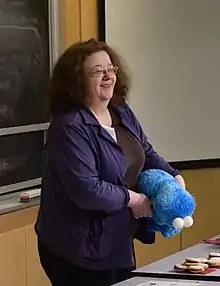Tanya Khovanova | |
|---|---|
Татьяна Гелиевна Хованова | |
 | |
| Nationality | Soviet Union |
| Other names | Tatyana Hovanova |
| Citizenship | United States |
| Education | Moscow State University (MS, PhD) |
| Children | 2 |
| Scientific career | |
| Fields | Combinatorics, Recreational mathematics |
| Institutions | Advanced Math and Science Academy Charter School Research Science Institute |
| Doctoral advisor | Israel Gelfand |
Tanya Khovanova (Татьяна Гелиевна Хованова, also spelled Tatyana Hovanova; born 25 January 1959) is a Soviet-American mathematician who became the second female gold medalist at the International Mathematical Olympiads. She is a lecturer in mathematics at the Massachusetts Institute of Technology.
Education
As a high school student, Khovanova became a member of the Soviet team for the International Mathematical Olympiad (IMO). In the summer of 1975, Valery Senderov gave the team a list of difficult mathematical problems used in the entrance exams of Moscow State University to discriminate against Soviet Jews, a topic she later wrote about.[1] Khovanova won the silver medal at the 1975 IMO, and a gold medal at the 1976 Olympiad. Her finish at the 1976 Olympiad was second among all competitors,[2] the highest achievement for female students until 1984, when Karin Gröger from East Germany tied for the first place.[3]
Khovanova graduated with honors from Moscow State University (MSU) with a master's degree in mathematics in 1981. She completed her Ph.D. at MSU in 1988 with Israel Gelfand as her doctoral advisor.[4]
Career
Khovanova left the Soviet Union in 1990, and worked for several years in Israel and the US as a postdoctoral researcher. However, she stopped working as a researcher to raise her children, and then worked in the telecommunications and military contracting industry, before returning to academia as a lecturer at MIT.[5]
Khovanova has been a mathematics competition coach at the Advanced Math and Science Academy Charter School in Marlborough, Massachusetts.[6] In 2010, she helped found the MIT PRIMES program for after school mentoring of local high school students, and she continues to serve as its head mentor. She is also head mentor for mathematics of the Research Science Institute, a summer research program for high school students at MIT.[7]
Research
In Khovanova's earlier mathematical research, she studied representation theory, the theory of integrable systems, quantum group theory, and superstring theory. Her later work explores combinatorics and recreational mathematics.[6]
Online activities
In the mid-1990s Khovanova created a website called Number Gossip, about the special properties of individual numbers.[8] In 2007, she created a mathematics blog, centered on mathematical puzzles and problem solving.[9]
Personal life
When Khovanova emigrated to Boston, she did not know how to drive. A friend gave her a copy of The Boston Driver's Handbook which she studied to learn tips before learning years later that the book was intended to be humorous.[10] She has two sons; her first was born in the Soviet Union.[11]
Recognition
An essay about Khovanova, "To Count the Natural Numbers," by Emily Jia, won the 2016 Essay Contest of the Association for Women in Mathematics.[12][13]
Selected works
Two of Khovanova's papers were included in the annual Best Writing on Mathematics volumes, in 2014 and 2016 respectively.[14][15]
- Khovanova, Tanya (2019). "On the Mathematics of the Fraternal Birth Order Effect and the Genetics of Homosexuality" (PDF). Archives of Sexual Behavior. Springer Science and Business Media LLC. 49 (2): 551–555. doi:10.1007/s10508-019-01573-1. hdl:1721.1/131866.2. ISSN 0004-0002. PMID 31691074. S2CID 37620479.
References
- ↑ Gonzalez, Robbie (October 11, 2011). "How to solve "Jewish" math problems". Gizmodo. Retrieved 2019-09-08.
- ↑ "Tanya Khovanova". International Mathematical Olympiad results. Retrieved 2019-09-07.
- ↑ "Karin Gröger". International Mathematical Olympiad results. Retrieved 2019-09-07.
- ↑ Tanya Khovanova at the Mathematics Genealogy Project
- ↑ Jia, Emily (2016). "To count the natural numbers". Association for Women in Mathematics.
- 1 2 "Tanya Khovanova". MIT Mathematics Department. Retrieved 2019-09-07.
- ↑ Etingof, Pavel; Gerovitch, Slava; Khovanova, Tanya (September 2015). "Mathematical Research in High School: The PRIMES Experience" (PDF). Notices of the American Mathematical Society. 62 (8): 910–918. doi:10.1090/noti1270.
- ↑ Black, Debra (March 9, 2010). "Website explains the mystery of numbers". Toronto Star.
- ↑ Zivkovic, Bora (June 8, 2012). "The Scienceblogging Weekly (June 8th, 2012)". Scientific American.
- ↑ Khovanova, Tanya (2018-12-16). "50 words". Boston Globe. Retrieved 2019-09-08 – via Newspapers.com.
- ↑ Khovanova, Tanya (2017-02-10). "Russian and American Children". Tanya Khovanova's Math Blog. Retrieved 2019-09-08.
- ↑ "Results of 2016 Essay Contest". AWM Programs: Essay Contest. Association for Women in Mathematics. Archived from the original on 2016-09-12. Retrieved 2019-09-07.
- ↑ Jia, Emily. "2016 Student Essay Contest High School Winner". Association for Women in Mathematics (AWM). Retrieved 6 May 2023.
- ↑ Pitici, Mircea (23 November 2014). The best writing on mathematics, 2014. Princeton. ISBN 9781400865307. OCLC 894169899.
{{cite book}}: CS1 maint: location missing publisher (link) - ↑ The best writing on mathematics. 2016. Pitici, Mircea, 1965-. Princeton, New Jersey. 7 March 2017. ISBN 9780691175294. OCLC 958799818.
{{cite book}}: CS1 maint: location missing publisher (link) CS1 maint: others (link)
External links
- Official website

- Tanya Khovanova publications indexed by Google Scholar